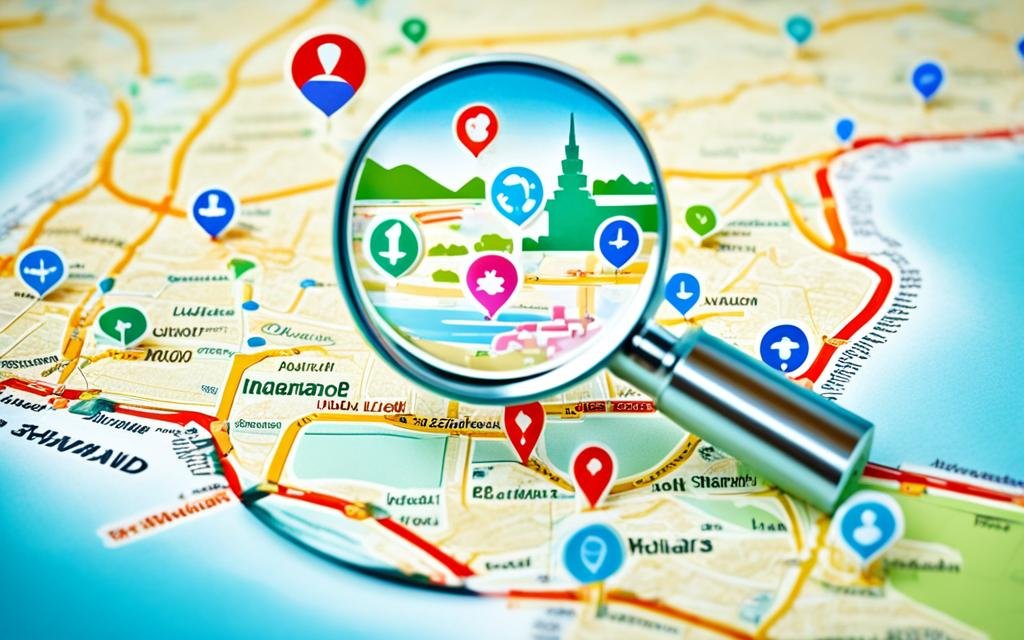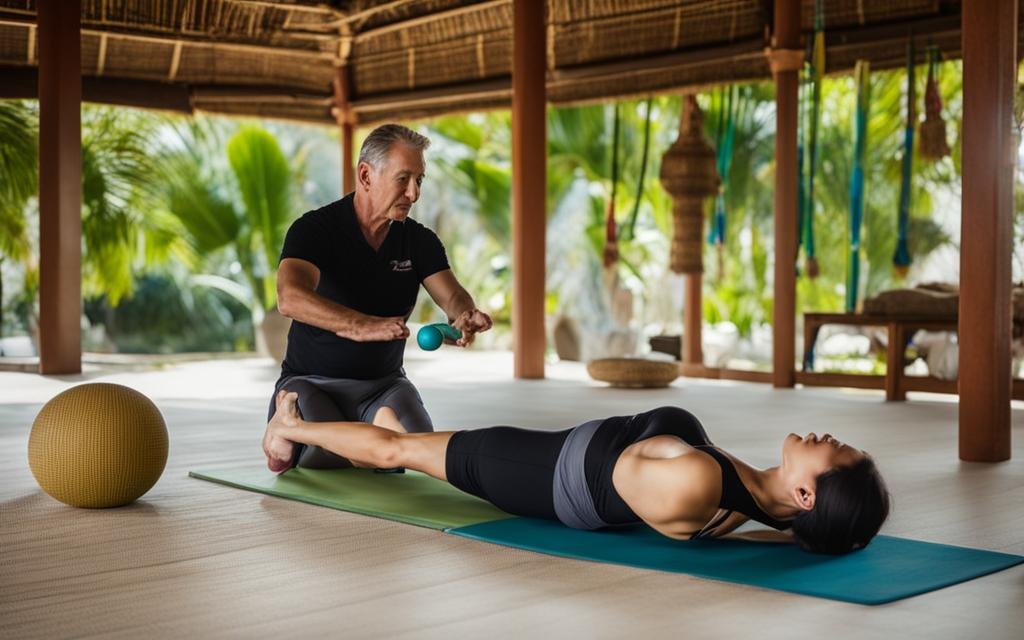Retiring in Thailand is a dream for many expats seeking a change of pace, a vibrant culture, and a lower cost of living. However, as retirees age, physical health becomes a top priority. Fortunately, Thailand offers a range of physical therapy solutions to ensure a comfortable and active retirement for expats. From holistic therapy and elderly exercise programs to specialized care and retiree healthcare options, Thailand caters to the diverse needs of retirees, providing a supportive environment to age gracefully.
Key Takeaways:
- Retiring in Thailand allows expats to embrace a retirement lifestyle that is affordable and enjoyable.
- Thailand offers a variety of physical therapy solutions to support the health and wellness of retirees.
- From holistic therapy to specialized care, retirees can find the right physical therapy services to meet their needs.
- Retiree healthcare options in Thailand provide access to quality medical care at a lower cost compared to Western countries.
- Aging in Thailand offers the opportunity to enjoy a vibrant culture, warm weather, and a strong sense of community.
Understanding the Thai Retirement Visa (Thai Retirement OA Visa)
The Thai Retirement Visa, also known as the Non-immigrant OA visa, is designed for retirees who wish to live in Thailand for an extended period of time. This visa provides a great opportunity for individuals to enjoy their retirement in the beautiful country of Thailand.
Eligibility Criteria for Retirees in Thailand
To be eligible for the retirement visa, retirees must be 50 years or older. This age requirement ensures that the visa is specifically tailored to individuals who have reached retirement age and are looking for a new adventure in Thailand.
Financial Requirements for Retirement Visa Applicants
Retirement eligibility in Thailand also requires meeting specific financial requirements. One of the options is to have at least 800,000 THB (Thai Baht) deposited in a Thai bank account for at least two months prior to the visa application. Another option is to have a minimum monthly income of 65,000 THB. Alternatively, applicants can combine a security deposit and annual income to meet the financial requirement, with a total of 800,000 THB.
Health Insurance Requirements for O-A Visa Holders
As part of the retirement visa process, health insurance is a requirement for O-A visa holders. The minimum coverage should be 100,000 USD, which includes coverage for COVID-19 treatment. This ensures that retirees have access to proper healthcare services during their stay in Thailand.

Having an understanding of the Thai Retirement Visa is crucial for retirees who are considering a life of adventure and relaxation in Thailand. By meeting the eligibility criteria, fulfilling the financial requirements, and obtaining the necessary health insurance coverage, retirees can embark on an exciting journey in the Land of Smiles.
An Overview of Healthcare in Thailand for Expats
When it comes to healthcare in Thailand, expats have access to a two-tiered system consisting of public and private healthcare facilities. Each option offers its own advantages and considerations for expatriates seeking medical services in the country.
Public vs. Private Healthcare Systems
The public healthcare system in Thailand is funded by the government and provides affordable healthcare services to both Thai citizens and expatriates. Public hospitals and clinics are widely available throughout the country and offer a range of medical treatments and procedures. However, it’s important to note that public healthcare facilities may have longer wait times for consultations and treatments, and English-speaking staff may be limited in some areas.
On the other hand, private healthcare facilities in Thailand provide high-quality medical services with shorter wait times and a greater emphasis on personalized care. Private hospitals and clinics often have a wider range of medical specialties, advanced technology, and a higher level of comfort and amenities. However, it’s worth noting that private healthcare in Thailand can be more expensive compared to public healthcare.
Navigating Health Insurance Policies for Expats
Given the importance of healthcare coverage, it is highly recommended that expats in Thailand obtain health insurance to protect themselves from unexpected medical expenses. Health insurance policies for expats can help cover the costs of hospital stays, surgeries, outpatient treatments, and other medical services.
When choosing a health insurance policy, it’s essential to consider the specific needs and circumstances of the individual or family. Expats should carefully review the coverage options, policy limits, exclusions, and premiums to ensure they have adequate protection. Additionally, it’s important to understand the network of healthcare providers that are covered by the insurance policy to ensure convenient access to medical services.

Navigating the healthcare system and understanding health insurance policies can be complex, especially for expats who are not familiar with the local healthcare landscape. Seeking assistance from a reputable insurance broker or an expat support network can provide valuable guidance and help expats make informed decisions about their healthcare coverage in Thailand.
Choosing the Right Health Insurance in Thailand
Minimum Coverage Considerations
When it comes to health insurance in Thailand, retirees need to ensure they have adequate coverage to protect their healthcare needs. It is essential to consider the minimum coverage requirements to make an informed decision.
Retirees should look for health insurance policies that cover hospital stays, surgeries, outpatient treatments, and emergency medical evacuation. These are crucial aspects of healthcare that should be included in the minimum coverage.
Benefits and Global Plan Options for Expats
Expats have the advantage of choosing from various health insurance providers that offer global plan options specifically designed for expatriates. These global plans provide coverage not only in Thailand but also in other countries, giving retirees peace of mind when traveling or residing abroad.
Some health insurance providers may offer additional benefits, such as coverage for preventive care, dental and vision services, mental health support, and alternative therapies. It is important to evaluate the benefits offered by different insurance providers to find a policy that suits individual needs and preferences.
Comparing Costs Amongst Thai Insurance Providers
When considering health insurance options, it is crucial to compare the costs and coverage provided by different insurance providers. This comparison allows retirees to find an insurance plan that offers the best value for money.
Factors to consider when comparing costs include monthly premiums, deductibles, co-pays, and out-of-pocket maximums. By comparing these costs, retirees can find an insurance provider that offers comprehensive coverage at a reasonable price.

Choosing the right health insurance in Thailand is an important decision for retirees. By considering the minimum coverage requirements, exploring the benefits and global plan options, and comparing costs amongst Thai insurance providers, retirees can ensure they have the necessary coverage to meet their healthcare needs.
Retire in Thailand Physical Therapy Solutions
Retiring in Thailand doesn’t mean sacrificing access to quality physical therapy solutions. Thailand offers a range of physical therapy programs specifically designed for retirees, including holistic therapy approaches and specialized exercise programs for the elderly.
These physical therapy solutions aim to improve mobility, manage pain, and enhance overall quality of life for retirees in Thailand.

| Physical Therapy Solutions | Description |
|---|---|
| Holistic Therapy | A holistic approach to physical therapy that focuses on the mind, body, and spirit. It encompasses various natural and alternative therapies, such as acupuncture, massage, and yoga, to promote overall well-being and healing. |
| Elderly Exercise Programs | Specialized exercise programs tailored to the needs of older adults. These programs focus on improving strength, balance, flexibility, and cardiovascular health, helping retirees maintain an active and independent lifestyle. |
| Pain Management | Comprehensive pain management strategies that address chronic pain conditions commonly experienced by retirees. These may include physical therapies, medication management, and lifestyle modifications to alleviate pain and improve quality of life. |
| Specialized Care | Targeted therapies and treatments for specific conditions or injuries. Retirees can benefit from specialized care programs that cater to their unique needs, providing personalized treatment plans for optimal recovery and functional improvement. |
Integrating into Retiree-Friendly Communities in Thailand
Retiring in Thailand offers not only a relaxed and vibrant lifestyle but also the opportunity to connect with like-minded individuals in retiree-friendly communities. Joining these communities can provide numerous benefits for retirees, from social support and access to activities and amenities to opportunities to make new friends. Embracing an expat community in Thailand can greatly enhance the retirement experience, providing a sense of belonging and a network of individuals who understand and share similar experiences.
To build a social network as a retiree in Thailand, there are several strategies that can be implemented. By participating in community events and activities, retirees can engage with others who share similar interests and hobbies. These events often provide a platform for meeting new people and forging connections that can lead to valuable friendships. Additionally, joining clubs or interest groups focused on specific activities, such as hiking, photography, or cooking, can provide retirees with opportunities to connect with individuals who share their passions.
Connecting with other expats in Thailand can also help retirees build a social network. Expatriate communities often organize social gatherings, meetups, and networking events specifically tailored for retirees. These events provide the perfect environment for meeting fellow expats, exchanging experiences, and developing lasting friendships. Online expat forums and social media groups can also be valuable tools for connecting with others, sharing information, and organizing social activities.
| Benefits of Expat Communities in Thailand: |
|---|
| 1. Social Support: Retiree-friendly communities offer a support system where retirees can find assistance, guidance, and companionship. |
| 2. Access to Activities and Amenities: These communities often provide a wide range of activities, such as fitness classes, cultural events, and recreational facilities, ensuring retirees can stay active and engaged. |
| 3. Opportunities to Make New Friends: Expatriate communities in Thailand are comprised of individuals from various backgrounds and cultures, creating diverse opportunities for retirees to form meaningful connections and friendships. |
Retirement Lifestyle: Day-to-Day Living in Thailand
Accommodation and Living Costs
Retiring in Thailand offers retirees the opportunity to enjoy a comfortable and affordable lifestyle. The cost of living in Thailand is significantly lower compared to many Western countries, allowing retirees to stretch their retirement savings further. With a range of accommodation options available, retirees can find a living arrangement that suits their preferences and budget.
When it comes to accommodation in Thailand, retirees can choose from renting apartments or houses, purchasing property, or living in retirement communities. Renting is a popular option for many retirees as it provides flexibility and eliminates the hassle of property maintenance. For those looking to stay long-term, purchasing property can be a wise investment, especially considering the lower property prices in certain regions of Thailand. Retirement communities are also a great choice for retirees seeking a community-focused environment with amenities and services catered to their needs.
Aside from accommodation, day-to-day expenses in Thailand are generally affordable. Groceries, dining out, transportation, and entertainment options offer good value for money. Retirees can explore local markets for fresh produce and affordable goods or indulge in dining experiences ranging from street food stalls to upscale restaurants.
The Appeal of Thailand's Climate and Culture
Thailand’s tropical climate and rich cultural heritage are a major draw for retirees. With its warm weather and abundant sunshine, Thailand offers a year-round outdoor lifestyle, perfect for engaging in activities like sports, gardening, or simply relaxing on the beaches. The country’s diverse landscapes, from picturesque mountains and lush forests to stunning coastlines and islands, provide retirees with endless opportunities for exploration and leisure.
Thai culture is renowned for its warmth, friendliness, and hospitality. Retirees can immerse themselves in the vibrant local communities, take part in festivities and cultural events, and interact with the welcoming Thai people. The country’s Buddhist heritage also adds a spiritual dimension to daily life, offering tranquility and mindfulness in retirement.
| Costs of Living in Thailand | Estimated Monthly Expenses |
|---|---|
| Housing (rent or mortgage) | $500 – $1,500 |
| Utilities (electricity, water, internet) | $100 – $200 |
| Groceries | $200 – $400 |
| Dining Out | $200 – $400 |
| Transportation | $50 – $100 |
| Entertainment and Leisure | $100 – $300 |
| Healthcare | $50 – $200 |
The Financial Advantages of Retiring in Thailand
Retiring in Thailand can offer significant cost savings on both medical expenses and living costs. With a lower cost of living compared to many Western countries, retirees can enjoy a comfortable and affordable retirement lifestyle. But the financial benefits of retiring in Thailand go beyond just a lower cost of living.
Cost Savings on Medical and Living Expenses
One of the major financial advantages of retiring in Thailand is the savings on healthcare expenses. Healthcare in Thailand is generally more affordable compared to Western countries, allowing retirees to access quality medical care at lower costs. The cost of medical procedures, consultations, and medications can be significantly cheaper, resulting in substantial cost savings for retirees.
Furthermore, the cost of living in Thailand, including accommodation, food, transportation, and entertainment, is generally lower compared to many Western countries. Housing options, such as renting apartments or houses, purchasing property, or living in retirement communities, provide a range of choices to fit different budgets and preferences. This affordability allows retirees to stretch their retirement savings further and enjoy a comfortable lifestyle without financial burden.
Evaluating Retirement Benefits in Thailand
In addition to cost savings, retirees may also be eligible for retirement benefits provided by the Thai government or their home country. These retirement benefits can provide an extra layer of financial security and stability during retirement. It is important for retirees to explore and evaluate the retirement benefits available to them, including pensions, social security, healthcare benefits, and other financial assistance programs. Understanding and maximizing these retirement benefits can further enhance the financial advantages of retiring in Thailand.
By taking advantage of the cost savings on medical and living expenses, as well as evaluating and utilizing available retirement benefits, retiring in Thailand can offer retirees financial peace of mind and a comfortable retirement lifestyle.
Physical Therapy Services: The Greenbell Clinic Approach
The Greenbell Clinic is a leading provider of physical therapy services in Thailand. They understand the unique needs of retirees and offer a comprehensive approach to holistic therapy and specialized care to support their health and wellness journey.
Holistic Therapy and Elderly Exercise Programs
The Greenbell Clinic believes in a holistic approach to physical therapy, recognizing that wellness is not just about treating physical ailments but also enhancing overall well-being. They offer a range of holistic therapy programs that integrate various techniques to address the mind, body, and spirit.
The clinic’s elderly exercise programs are specifically designed to cater to the unique needs of older adults. These programs focus on enhancing mobility, improving strength, and promoting independence through tailored exercise routines. The experienced therapists at the Greenbell Clinic guide retirees through safe and effective exercises, helping them maintain an active and healthy lifestyle.
Pain Management and Specialized Care
For retirees experiencing pain or with specific conditions or injuries, the Greenbell Clinic offers specialized care and pain management services. Their team of trained and experienced therapists works closely with retirees to develop personalized treatment plans that address their unique needs and goals.
Whether it’s managing chronic pain, recovering from a joint replacement surgery, or addressing other musculoskeletal issues, the Greenbell Clinic provides tailored physical therapy services to help retirees find relief and improve their quality of life. Their specialized care focuses on maximizing functional abilities and promoting long-term wellness.
With their commitment to excellence and comprehensive approach, the Greenbell Clinic is dedicated to helping retirees in Thailand live active, healthy, and fulfilling lives.
Conclusion: Embracing Retirement in Thailand with the Right Support
Retiring in Thailand presents a wonderful opportunity for retirees to embrace a fulfilling and active lifestyle during their golden years. With its attractive features such as affordable living costs, warm weather, and retiree-friendly communities, Thailand has become a preferred destination for retirees from around the world. However, to fully enjoy this new chapter of life, it is important to have the right support systems in place.
One of the key aspects of a comfortable retirement in Thailand is access to physical therapy solutions. Thailand offers a wide range of services dedicated to the health and wellness of retirees. From holistic therapy approaches to specialized exercise programs designed for the elderly, retirees can find the support they need to maintain mobility, manage pain, and enhance their overall well-being.
In addition to physical therapy, retirees in Thailand should also consider their healthcare options and the importance of building a strong social network. Navigating the healthcare system effectively, obtaining suitable health insurance coverage, and connecting with other retirees in retiree-friendly communities are all crucial elements that contribute to a fulfilling retirement experience in Thailand.
By embracing retirement in Thailand and seeking out the right support services, retirees can enjoy a vibrant lifestyle, made possible by the country’s rich culture, affordable living costs, and high-quality healthcare facilities. With the right resources and a positive mindset, retirees can make the most of their retirement years in Thailand, creating lasting memories and enjoying a fulfilling and rewarding chapter of life.
FAQ
What is the Thai Retirement Visa?
The Thai Retirement Visa, also known as the Non-immigrant OA visa, is designed for retirees who wish to live in Thailand for an extended period of time.
What are the eligibility criteria for retirees in Thailand?
To be eligible for the retirement visa, retirees must be 50 years or older.
What are the financial requirements for retirement visa applicants?
Financial requirements include having at least 800,000 THB deposited in a Thai bank account for at least two months prior to the visa application, a minimum monthly income of 65,000 THB, or a combination of a security deposit and annual income totaling 800,000 THB.
What are the health insurance requirements for O-A visa holders?
Health insurance is a requirement for O-A visa holders, with a minimum coverage of 100,000 USD, including coverage for COVID-19 treatment.
What are the differences between public and private healthcare systems in Thailand?
Thailand has a two-tiered healthcare system consisting of public and private healthcare facilities. The public healthcare system is funded by the government and provides affordable healthcare services, but it may have longer wait times and limited English-speaking staff. Private healthcare facilities in Thailand offer high-quality medical services with shorter wait times and English-speaking staff, but they are more expensive.
What should expats consider when obtaining health insurance in Thailand?
Expats should consider the minimum coverage requirements, which include coverage for hospital stays, surgery, outpatient treatments, and emergency medical evacuation.
What are the benefits of expat-friendly communities in Thailand?
Joining retiree-friendly communities in Thailand can provide numerous benefits, such as social support, access to activities and amenities, and opportunities to make new friends.
How can retirees build a social network in Thailand?
Retirees can build a social network by participating in community events and activities, joining clubs or interest groups, and connecting with other expats in Thailand.
What are the accommodation options and living costs in Thailand?
Accommodation options include renting apartments or houses, purchasing property, or living in retirement communities. Thailand offers a lower cost of living compared to many Western countries.
What are the financial advantages of retiring in Thailand?
Retiring in Thailand can offer significant cost savings on both medical expenses and living costs. Healthcare in Thailand is generally more affordable compared to Western countries, allowing retirees to access quality medical care at lower costs. Retirees may also be eligible for retirement benefits provided by the Thai government or their home country, further enhancing their financial stability during retirement.
What physical therapy solutions are available for retirees in Thailand?
Thailand offers a range of physical therapy programs specifically designed for retirees, including holistic therapy approaches and specialized exercise programs for the elderly.

